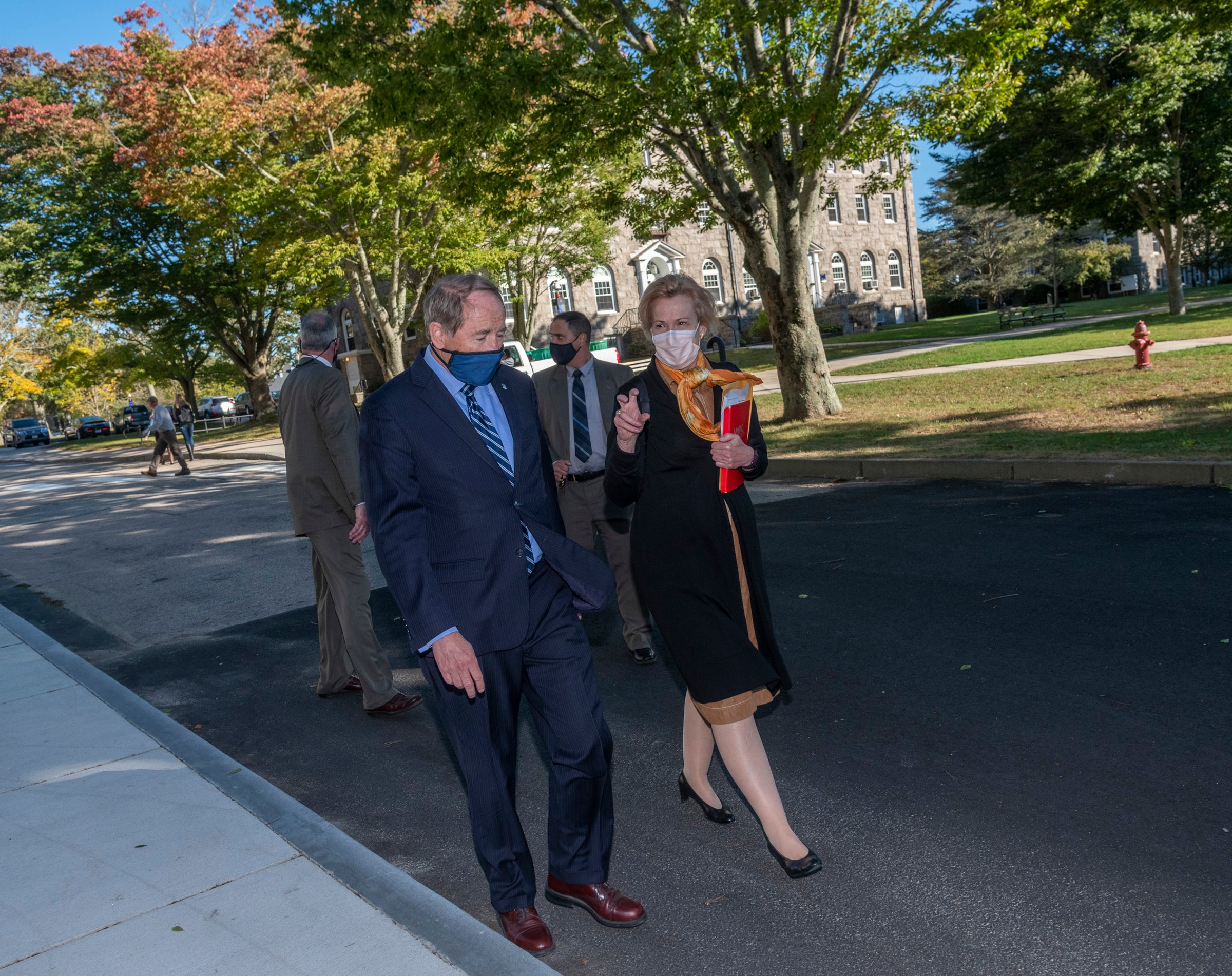KINGSTON, R.I. – Oct. 9, 2020 – Dr. Deborah Birx, coordinator of the White House Coronavirus Task Force, praised University of Rhode Island leaders for their months of preparation that led to a flexible response to the COVID-19 pandemic during her visit Thursday afternoon to the Kingston Campus.
“The message I wanted to carry across to the 23 universities and the 32 or so states that we’ve visited is that universities that spent their spring and summer really planning and were willing to have a flexible plan that was comprehensive and collaborative … has been very critical,” said Birx, speaking at a late afternoon press conference on the common outside the Fascitelli Center for Advanced Engineering. “It was very interesting to hear about the thousands of hours and millions of dollars that have been spent to really ensure that the students, faculty, staff and the community remain safe through this experience.”
Over the past several months, Ambassador Birx, a world-renowned global health official and leader in the field of HIV/AIDS, has toured college and university campuses to evaluate what is “happening on the ground” and talk with state, local and higher education leaders.
During her three-hour visit to the Kingston Campus, Birx met with Gov. Gina Raimondo and Rhode Island Department of Health Director Dr. Nicole Alexander-Scott, President David M. Dooley, URI’s senior leadership team and COVID-19 Task Force leaders. She also toured the University’s COVID-19 testing site at the Memorial Union, as the University ramps up mandatory testing of the entire student body to establish a baseline data set to measure community health for the remainder of the semester.
In her talks with officials, Birx said she stressed the need to expand surveillance testing and wastewater testing. She praised the University for establishing 600 units for isolation and quarantine and for expansion of mandatory testing of more than 16,000 students during the next two weeks.
“We’re very excited to be here, when yesterday and now today, we’ll reach more than 3,000 or 4,000 students tested,” she said of the effort, which will test about 1,600 students a day. “I think we’re on a great momentum to get through all of the students … and then sustain that over time.”
She also commended the multitude of signs around the campus urging the community to follow COVID-19 precautions. “One of our favorite signs talked about a student’s phone, mask, ID, and wallet,” she said. “[It] reminds them that a mask is part of what we do every day now.”
In a late afternoon session, Birx met with several professors and students who are conducting research on COVID-19 related projects, including Associate Professor Kunal Mankodiya and students working on a “smart mask” that can detect coronavirus symptoms, and Professor Angela Slitt, who is exploring a saliva test for the virus.
“It’s a very promising test,” said Birx. “What’s exciting is it works outside of the PCR platform using different reagents that will make the test more applicable, not only here, but potentially across the globe.”
As she tours the Northeast, including a visit to Connecticut earlier Thursday, Birx said she wanted to alert officials to a shift in “viral dynamics” as the region sees an uptick in virus cases. More cases are occurring in small, private gatherings where asymptomatic individuals, not knowing they are infected, spread the virus to friends and family, she said.
“As workplaces, public areas, retail groups have really created safe spaces, where we’re seeing the spread occur now is in private spaces where we feel comfortable, where we take off our masks, and invite in our neighbors and friends,” she said. “We really want to understand where that’s happening, stopping it before it becomes broad based and really proactively giving messages to communities about how to safely gather, how to be socially engaged, but physically distanced and really protecting those with vulnerabilities.”
President Dooley appreciated the chance to have the University’s leadership team, COVID-19 Task Force, faculty and students share how the University is responding to the pandemic and to hear from Birx how comparable institutions are handling the crisis. Also, he said, the national data that Birx shared was encouraging.
“There’s an awful lot of students who are doing exactly the right thing at many different kinds of universities. And that in some places, the initial upticks have leveled off. That’s what we’re hoping to achieve here at URI through this mechanism of comprehensive, mandatory testing of students and ongoing surveillance testing,” Dooley said.
“Also, the nature of what they’re seeing in regard to asymptomatic spread that we thought we’re seeing here,” he added. “It was encouraging for us to know that is in fact a larger trend. It’s pretty consistent with what other institutions are seeing. We can look at the steps that they’ve taken, modify them to fit the URI context, maybe invent some new ideas of our own, and be able to control it.”

